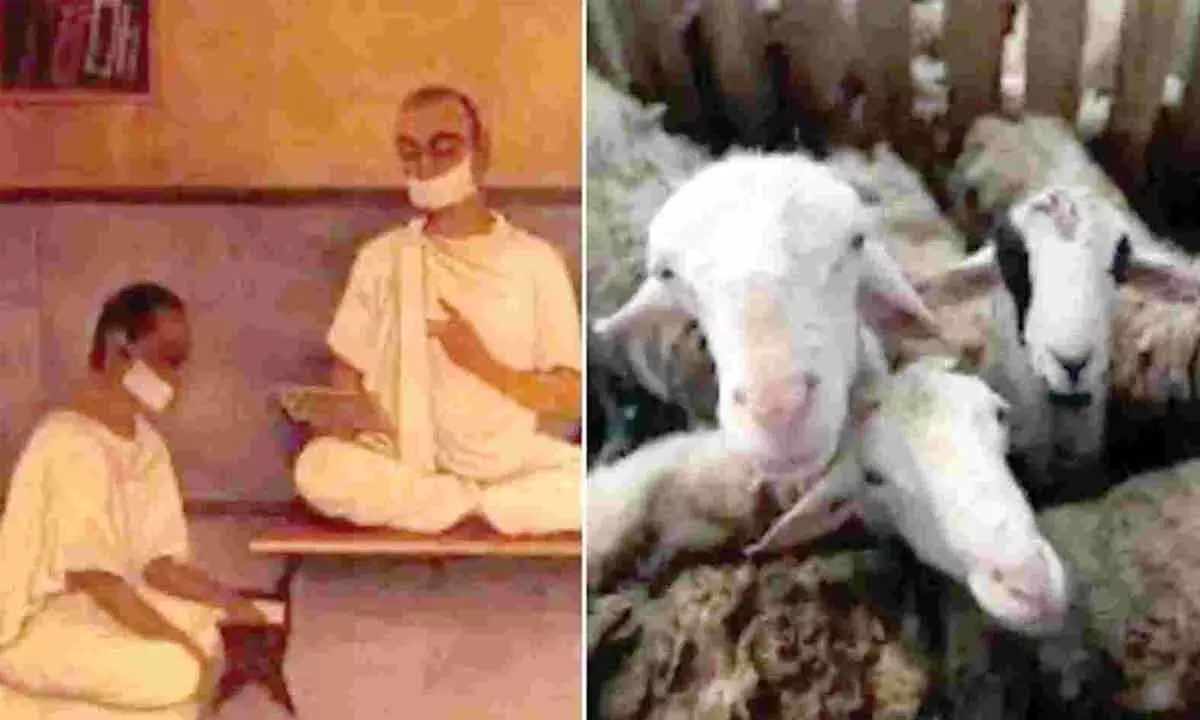Jains observe ‘Ayambil’ to atone for animal slaughter on Bakrid

- Observe fast or observe Ayambil, a fast wherein they only eat cereals and non-sprouted pulses once a day
- Those who find it difficult to observe fast or Ayambil, usually refrain from consuming white food items, most notably milk, ghee and rice as a mark of their disapproval of the mindless killings of animals on Bakrid
♦ The idea behind this voluntary penance is to inflict suffering on oneself and share the pain of the animals that are slaughtered on the day of Eid-al-Adha
♦ White food items have significance as most of the dairy items are white in colour and on Bakrid, most of the animals sacrificed are dairy animals
♦ Many also donate to the cause of Jivdaya, one of the most important tenets of Jainism, which is similar in characteristics to Animal welfare
Hyderabad: Every year on the day of Eid-al-Adha, popularly known as Bakrid, millions of animals, most prominently goats but also cows, sheep, buffalos and camels are slaughtered across the world as an integral part of the Islamic festival.
According to the Islamic tradition, animals are sacrificed to commemorate Ibrahim’s willingness to sacrifice his only son. By some estimates, more than 10 million animals are killed around the globe on the day of Bakrid. However, the followers of Jainism have a unique approach to mark the festival that involves unfortunate killings of crores of animals.
To compensate the killings and express their solidarity with the slaughtered animals, Jains go on absolute fast or observe Ayambil, a fast wherein the community members only eat cereals and non-sprouted pulses once a day. Not to mention, both fast and Ayambil involves consumption of boiled water, allowed only until the sunset.
Those who find it difficult to observe fast or Ayambil, usually refrain from consuming white food items, most notably milk, ghee and rice as a mark of their disapproval of the mindless killings of animals on Bakrid. Though abstinence of only white food items is not mandatory and Jains can forego any food items that they want to as a symbolic gesture to oppose the killings of animals. However, white food items have significance as most of the dairy items are white in colour and on Bakrid, most of the animals sacrificed are dairy animals.
Jains usually make these sacrifices out of their own volition and there is no tradition or ritual that ordains them to compulsorily either observe fast or Ayambil or give up consuming some of the food items. The idea behind this voluntary penance is to inflict suffering on oneself and share the pain of the animals that are slaughtered on the day of Eid-al-Adha.
Many who do not follow either of the above practices, donate to the cause of Jivdaya, one of the most important tenets of Jainism, which is similar in characteristics to Animal welfare. Donations made to Jivdaya are used to prevent cruelty against animals, reduce their suffering by providing them shelter, nutrition, water, and healthcare. It also includes rescuing animals from slaughterhouses and abattoirs where they are condemned to live in squalor and filth before being inevitably killed. As a part of Jivdaya, Jains also donate to Gaushalas, the protective shelters meant for the welfare of cows. Just like Hindus, Jains also consider the cow to be sacred.
Hemchandra Surishwarji Maharaj, A Jain Sadhu said, “We do understand that it is an important occasion for the Muslim community and offering sacrifice is a part of it. As Jains cannot stop Muslims from following their religious practices, we compensate the killing of slaughtered animals by observing fast on this day.”
It is to uphold this sanctity of animal life and to empathise with those mercilessly slaughtered, Jains willingly observe fasts, Ayambil, refrain from consuming certain food items, and donate to Jivdaya on Bakrid.
Ahinsā is another important tenet of Jainism that forms the cornerstone of its ethics and doctrine. It means to be utterly harmless, not only to oneself but to others as well, including all forms of life, from the largest of mammals to the smallest of microorganisms on Earth. Jainism professes equal rights for all living beings regardless of their size, shape, or different spiritual developments. No living being has a right to harm, injure, or kill any other living being, be it animals, insects, or plants.

















